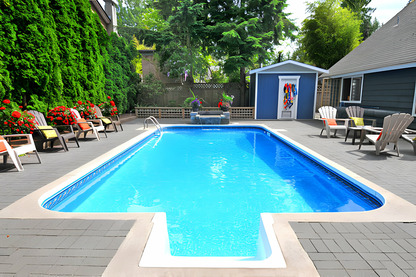Welcome to the serene world of “Green Cleaning for Your Swimming Pool: Sustainable Water Maintenance,” where the sparkle of a crystal-clear pool meets the gentle touch of eco-friendly practices. Whether you’re a pool enthusiast, an environmentally conscious homeowner, or simply someone who loves the joy of a refreshing swim, this guide is your gateway to a cleaner, greener, and more sustainable pool experience.
In the next paragraphs, we’ll dive into the importance of choosing green cleaning for your swimming pool, exploring how it benefits the environment, enhances health, and contributes to long-term cost savings. We’ll unravel the secrets of eco-friendly pool cleaning products, sustainable maintenance practices, and the beauty of incorporating natural elements into your pool landscape. Join us on this journey toward a pool that not only delights your senses but also reflects a commitment to preserving our planet’s precious resources. Let’s dive into the simplicity and effectiveness of “Green Cleaning for Your Swimming Pool: Sustainable Water Maintenance.”
Here is our related post on Top Expert Guide to Cleaning and Maintaining Your Swimming Pool
Importance of Green Pool Cleaning
1. Environmental Impact
Opting for green pool cleaning minimizes the environmental impact of traditional pool maintenance practices. Conventional pool chemicals can contribute to water pollution, harming aquatic ecosystems. Green cleaning aims to reduce the ecological footprint of your pool while maintaining water quality.
2. Health Benefits
Green pool cleaning prioritizes the health of both swimmers and the environment. Traditional pool chemicals may release harmful fumes, posing respiratory risks. Choosing eco-friendly alternatives creates a healthier pool environment for everyone, especially those with sensitivities to chemical exposure.
3. Long-Term Cost Savings
While some green pool products may have a slightly higher upfront cost, they often lead to long-term savings. Sustainable practices, such as natural filtration methods, can reduce reliance on expensive chemicals and extend the lifespan of pool equipment, contributing to overall cost efficiency.
4. Conservation of Resources
Green pool cleaning aligns with the conservation of resources. Traditional pool chemicals can contribute to water waste and excessive energy consumption. Sustainable practices, such as water recycling and energy-efficient equipment, help conserve valuable resources for a more environmentally responsible pool.
5. Promotion of Eco-Awareness
Maintaining a green swimming pool fosters eco-awareness among pool users. It serves as a visible demonstration of environmental responsibility, encouraging others to adopt sustainable practices. Green pools not only contribute to individual well-being but also inspire a collective commitment to a greener lifestyle.
See also our post on The Ultimate Guide to Estate Cleaning: Everything You Need to Know
Eco-Friendly Pool Cleaning Products
Natural Pool Cleaners
Explore natural pool cleaners that use ingredients like enzymes and plant extracts. These cleaners effectively break down organic matter without introducing harmful chemicals into the water. Look for products labeled as biodegradable and non-toxic for a greener alternative to conventional cleaners.
Mineral Sanitizers
Consider using mineral sanitizers that employ minerals like copper and silver to control bacteria and algae growth. These systems reduce the need for chlorine and provide a gentler, eco-friendly approach to water sanitation. Mineral sanitizers contribute to water quality without the environmental drawbacks of traditional chemicals.
Ozone Generators
Investigate ozone generators for pool water purification. Ozone is a powerful oxidizer that eliminates contaminants, reducing the reliance on chlorine. Ozone generators are energy-efficient and provide a sustainable option for maintaining water clarity without the environmental impact associated with chlorine use.
Eco-Friendly Shock Treatments
When shock treatments are necessary, opt for eco-friendly alternatives. Look for shock treatments that utilize hydrogen peroxide or other non-chlorine oxidizers. These treatments break down contaminants without contributing to the production of harmful chloramines, promoting both water quality and sustainability.
Natural Filtration Systems
Consider upgrading to natural filtration systems, such as biofilters or aquatic plants. These systems use natural processes to filter impurities from the water, reducing the need for mechanical filtration and chemical additives. Natural filtration contributes to a healthier ecosystem within the pool.
See also our post on How to Clean and Maintain Your Home’s Rain Gutters: Tips and Tricks which you will not want to miss.
Sustainable Pool Maintenance Practices
Regular Skimming and Netting
Implement regular skimming and netting practices to remove debris from the pool surface. This prevents organic matter from sinking to the bottom and decomposing, reducing the need for chemical treatments. Skimming is a simple yet effective method for maintaining a clean pool environment.
Proper Water Circulation
Optimize water circulation to distribute chemicals evenly and prevent stagnation. Ensure that pool pumps and filters are well-maintained and operate efficiently. Proper circulation minimizes the reliance on excessive chemical treatments and contributes to consistent water quality.
Water Recycling
Explore water recycling options to minimize water waste. Install a rainwater harvesting system or consider recycling backwash water from the pool filter. Water recycling not only conserves a precious resource but also reduces the need to constantly replenish the pool with fresh water.
Energy-Efficient Pool Equipment
Upgrade to energy-efficient pool equipment, such as variable-speed pumps and LED lighting. Energy-efficient systems reduce overall energy consumption, contributing to sustainable pool operation. These upgrades not only benefit the environment but also lead to long-term cost savings.
Regular Equipment Maintenance
Schedule regular maintenance for pool equipment to ensure optimal performance. Well-maintained pumps, filters, and heaters operate more efficiently, reducing the need for excessive chemical treatments. Regular equipment checks also prevent energy wastage and extend the lifespan of pool components.
See also our post on Essential Things to Know About Greenwashing in the Cleaning Industry
Natural Pool Landscaping
Aquatic Plants
Integrate aquatic plants into the pool landscape to enhance water quality. Plants such as water lilies and submerged oxygenators act as natural filters, absorbing nutrients and impurities. Aquatic plants contribute to the overall health of the pool ecosystem while providing a visually appealing and sustainable landscape.
Shade Trees
Plant shade trees strategically around the pool area to reduce sunlight exposure. Shade minimizes the formation of algae, reducing the need for algaecides and additional chemical treatments. Shade trees also create a comfortable environment for swimmers.
Permeable Pool Deck Materials
Opt for permeable pool deck materials, such as porous pavers or natural stone. Permeable surfaces allow rainwater to penetrate, reducing runoff and preventing water waste. Choosing environmentally friendly deck materials contributes to sustainable pool design and maintenance.
Wildlife-Friendly Design
Design the pool area to be wildlife-friendly by incorporating features like bird baths or small ponds. Wildlife can contribute to the pool ecosystem by consuming insects and promoting a balanced environment. Creating a space that welcomes wildlife enhances biodiversity and supports a sustainable pool ecosystem.
Natural Pest Control
Implement natural pest control methods to minimize the use of chemical pesticides. Consider introducing beneficial insects or utilizing natural repellents to control pests. Natural pest control practices promote a healthy pool environment without compromising sustainability.
See also our post on 10 Pros and Cons of Green Cleaning Services which you will not want to miss.
Educating Pool Users
Green Pool User Guidelines
Provide pool users with guidelines for maintaining a green pool environment. Encourage practices such as showering before swimming, disposing of trash responsibly, and using eco-friendly sunscreens. Educating pool users contributes to a collective effort in sustaining a green pool.
Interactive Information Sessions
Conduct interactive information sessions or workshops for pool users. Share insights into the importance of green pool practices, the benefits of eco-friendly products, and the impact of individual actions on pool sustainability. Engaging users fosters a sense of responsibility and participation in maintaining a green pool.
Informative Signage
Install informative signage around the pool area highlighting green cleaning practices and their benefits. Clear and visually appealing signage educates pool users on sustainable behaviors and encourages compliance with eco-friendly guidelines.
Online Resources
Create online resources or brochures that pool users can access. Provide information on sustainable pool practices, eco-friendly products, and steps to reduce the environmental impact of pool use. Online resources empower users to make informed choices for a greener pool experience.
Feedback Mechanism
Establish a feedback mechanism for pool users to share their thoughts on green pool practices. Encourage users to provide feedback on the effectiveness of eco-friendly products, suggestions for improvement, and their overall experience. A feedback loop enhances communication and promotes continuous improvement in sustainable pool management.
Here is our post on Green Cleaning Products for an Eco-Friendly Kitchen which will make your cleaning task hassle free.
Conclusion
As we come to the end of our investigation into “Green Cleaning for Your Swimming Pool: Sustainable Water Maintenance,” picture a swimming pool that is not only inviting with its pristine waters but also a monument to environmental care. By adopting green cleaning methods, selecting eco-friendly supplies, and cultivating a sustainable culture, you can turn your pool into a sanctuary that revitalises your body and the environment. Let this guide be your travel companion on the path to a greener, cleaner, and more pleasurable pool experience. Jump in and enjoy the swim, knowing that every ripple adds to the harmony of a sustainable aquatic paradise.














